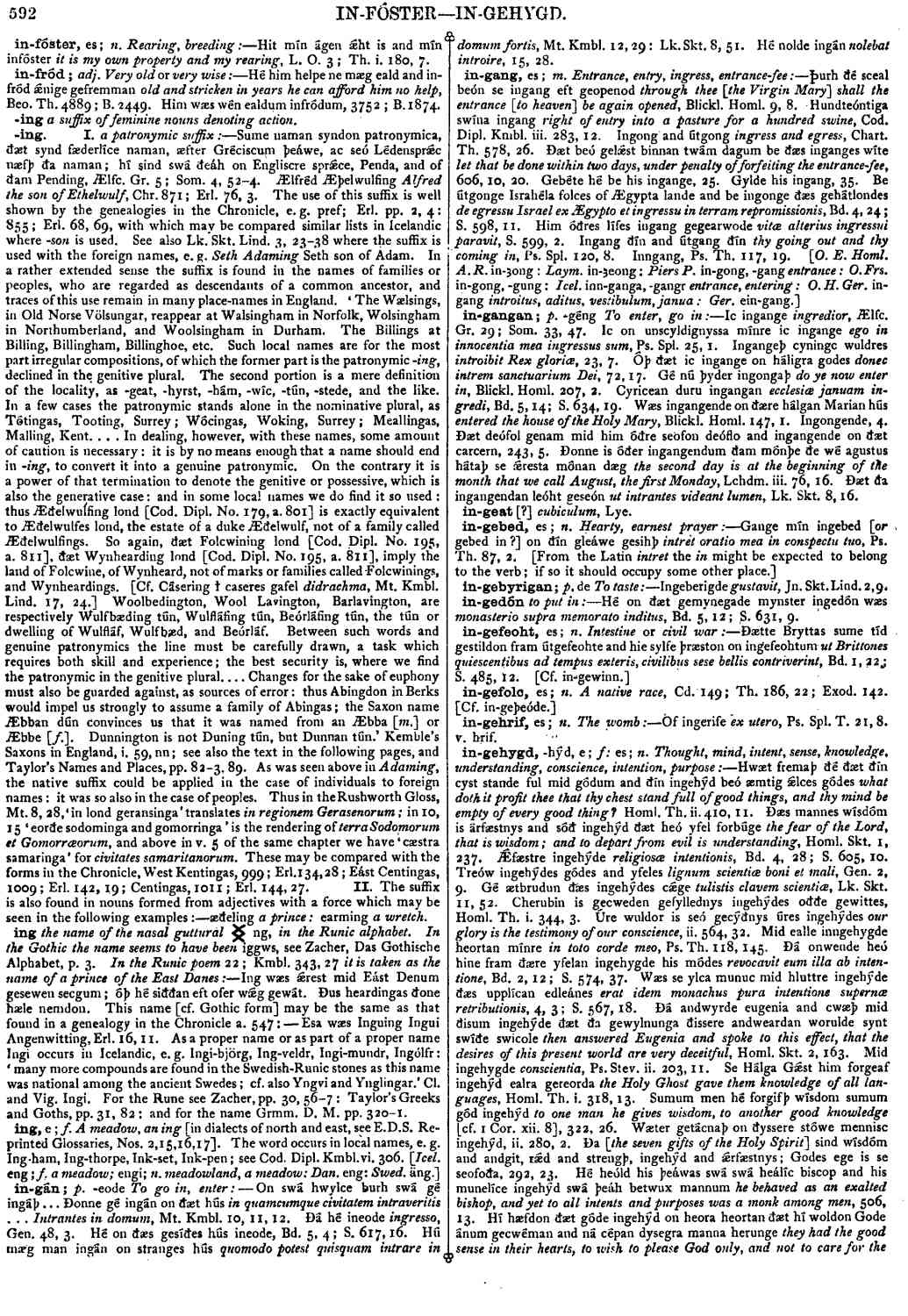-ing
- suffix
-
Sume naman syndon patronymica, ðæt synd fæderlíce naman, æfter Gréciscum þeáwe, ac seó Lédensprǽc næfþ ða naman; hí sind swá ðeáh on Engliscre sprǽce, Penda, and of ðam Pending,
- Ælfc. Gr. 5 ;
- Som. 4, 52-4.
-
Ælfréd Æþelwulfing
Alfred the son of Ethelwulf,
- Chr. 871 ;
- Erl. 76, 3 .
-
The use of this suffix is well shown by the genealogies in the Chronicle,
e.g. pref; Erl. pp. 2, 4 : 855; Erl. 68, 69, with which may be compared similar lists in Icelandic where
-son is used. See also Lk. Skt. Lind. 3, 23-38 where the suffix
is used with the foreign names, e. g.
Seth Adaming
Seth son of Adam.
In a rather extended sense the suffix is found in the names of families or peoples, who are regarded as descendants of a common ancestor, and traces of this use remain in many place-names in England. 'The Wælsings, in Old Norse Völsungar, reappear at Walsingham in Norfolk, Wolsingham in Northumberland, and Woolsingham in Durham. The Billings at Billing, Billingham, Billinghoe, etc. Such local names are for the most part irregular compositions, of which the former part is the patronymic -ing, declined in the genitive plural. The second portion is a mere definition of the locality, as -geat, -hyrst, -hám, -wíc, -tún, -stede, and the like. In a few cases the patronymic stands alone in the nominative plural, as Tótingas, Tooting, Surrey ; Wócingas, Woking, Surrey ; Meallingas, Malling, Kent.... In dealing, however, with these names, some amount of caution is necessary : it is by no means enough that a name should end in -ing, to convert it into a genuine patronymic. On the contrary it is a power of that termination to denote the genitive or possessive, which is also the generative case: and in some local names we do find it so used : thus Æðelwulfing lond [Cod. Dipl. No. 179, a. 801] is exactly equivalent to Æðelwulfes lond, the estate of a duke Æðelwulf, not of a family called Æðelwulfings. So again, ðæt Folcwining lond [Cod. Dipl. No. 195, a. 811], ðæt Wynhearding lond [Cod. Dipl. No. 195, a. 811], imply the land of Folcwine, of Wynheard, not of marks or families called Folcwinings, and Wynheardings. [Cf. Cásering ł caseres gafel didrachma, Mt. Kmbl. Lind. 17, 24.] Woolbedington, Wool Lavington, Barlavington, are respectively Wulfbæding tún, Wulfláfing tún, Beórláfing tún, the tún or dwelling of Wulfláf, Wulfbæd, and Beórláf. Between such words and genuine patronymics the line must be carefully drawn, a task which requires both skill and experience; the best security is, where we find the patronymic in the genitive plural.... Changes for the sake of euphony must also be guarded against, as sources of error : thus Abingdon in Berks would impel us strongly to assume a family of Abingas; the Saxon name Æbban dún convinces us that it was named front an Æbba [m.] or Æbbe [f. ]. Dunnington is not Duning tún, but Dunnan tún.'- Kemble's Saxons in England, i. 59, nn;
- pp. 82-3, 89.
-
As was seen above in Adaming,
the native suffix could be applied in the case of individuals to foreign names :
it was so also in the case of peoples. Thus in the Rushworth Gloss, Mt. 8, 28,
in lond geransinga
translatesin regionem Gerasenorum;
- in 10, 15
eorðe sodominga and gomorringa
is the rendering ofterra Sodomorum et Gomorræorum,
and above in v. 5 of the same chapter we havecæstra samaringa
forcivitates samaritanorum.
- These may be compared with the forms in the
- Chronicle, West Kentingas, 999 ;
- Erl. 134, 28 ;
- Eást Centingas, 1009 ;
- Erl. 142, 19 ;
- Centingas, l0ll ;
- Erl. 144, 27 .
-
æðeling
a prince :
-
earming
a wretch.
Bosworth, Joseph. “-ing.” In An Anglo-Saxon Dictionary Online, edited by Thomas Northcote Toller, Christ Sean, and Ondřej Tichy. Prague: Faculty of Arts, Charles University, 2014. https://bosworthtoller.com/20571.
Checked: 1